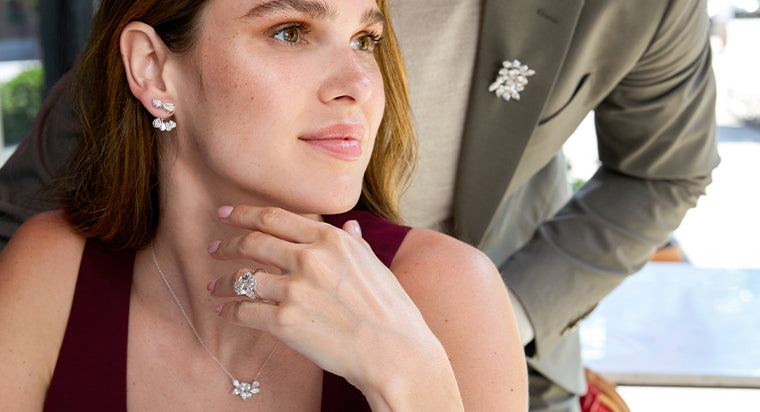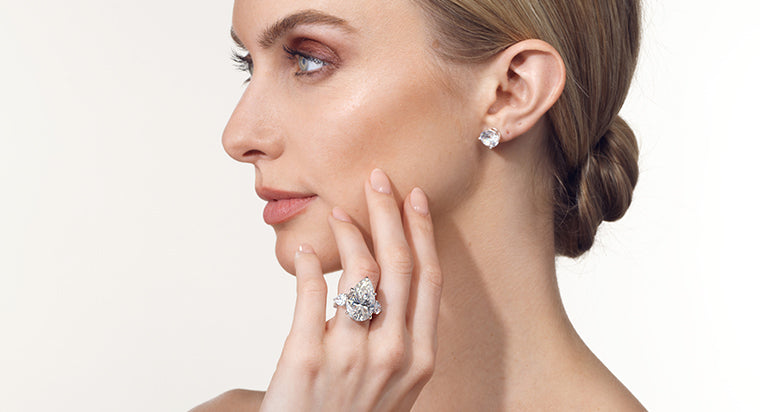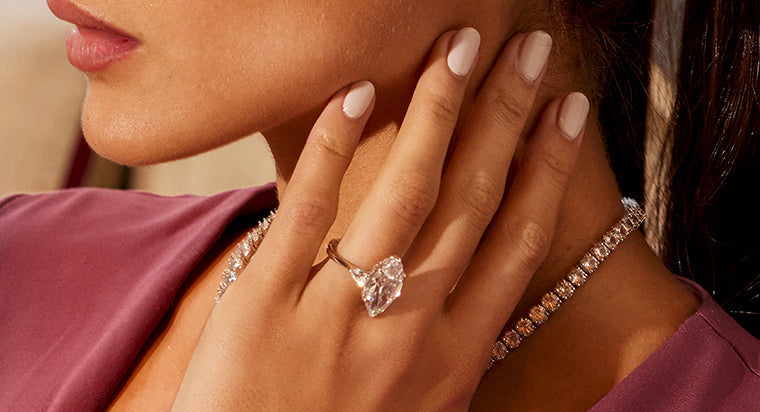Buying Guide for Vintage Diamond Engagement Rings

No other engagement ring spells romance quite like a vintage diamond engagement ring. They’re luxurious, offer timeless character and tell a story of love that endures through time. Plus, these one-of-a-kind rings reflect the wearer’s individuality and make for stunning heirloom pieces. So, we’re hardly surprised to see that more and more brides are saying “Yes” to this ring.
Do you have your heart set on a vintage ring? You’re in the right place.
In this guide, we’ll walk you through the most popular eras, how to choose the right one for your lifestyle, and how to care for your piece.
TABLE OF CONTENTS
What are Vintage Rings?
Vintage diamond engagement rings reflect the charm of bygone eras, transporting you straight back to history. These rings are typically at least 20 to 30 years old and often draw inspiration from specific design periods like Art Deco, Victorian, or Edwardian. Bold yet sophisticated, they’re resplendent with details—think beautiful intricate work, romantic silhouettes, and dazzling sparkle. But beyond visual aesthetics, they also sparkle with exquisite craftsmanship and character. When you choose a vintage ring, you're sure to end up with a beautiful piece that radiates soul and story.
Why Choose Vintage Diamond Engagement Rings?
For starters, vintage diamond engagement rings are completely original—no mass production, no cookie-cutter styles—just one-of-a-kind designs that ensure you and your ring stand out from the crowd. They're perfect for brides who want something truly personal, not a ring that looks like everyone else's.
Vintage rings have a timeless quality that transcends trends. They will look on-trend now and forever, making them a meaningful symbol of love.
What also makes vintage rings wow-worthy is their distinct, elaborate design. Whether you choose a piece inspired by the romantic Victorian era or a ring influenced by the bold Art Deco period, your sparkler will surely be bursting with personality and history.
Another major plus? With these pieces, you're not just getting a ring; you’re wearing a story-- one that's crafted expertly. Yep! These pieces are often handcrafted with incredible attention to detail, featuring intricate elements that machines can’t replicate. That means superior craftsmanship and, in many cases, better durability than you'd expect.
Having said that, there are a few things to keep in mind. Some vintage rings may require extra care to maintain, and resizing or customizing them isn’t always easy. But for many, the charm and soul of a vintage piece far outweigh the fuss. After all, what better way to celebrate a once-in-a-lifetime kind of love than with a ring that’s just as unique?
Types of Vintage Diamond Engagement Rings
-
Victorian engagement rings (1837–1901): Named after Queen Victoria, rings from this era are known for romantic and ornate details. Designs are heavily inspired by nature—so you'll often see leaves, floral engravings, and even heart motifs—and have symbolic meanings. These rings are typically crafted in yellow or rose gold and paired with colored gemstones or with old mine cut and rose-cut diamonds.
Perfect for: Brides who are drawn to meaningful details and romantic symbolism.
-
Edwardian engagement rings: (1901–1915) Refined and elegant, these rings are gorgeous and graceful. They’re inundated with delicate filigree work, milgrain edges, scrollwork, and lace-like designs. Platinum became popular during this era, and diamonds were often paired with gemstones for a soft, regal look.
Perfect for: Those who want an elegant ring that has an airy, luxurious feel.
-
Art Deco engagement rings (1920s–1930s) Love a bold and statement-worthy ring? Then this is the one for you!
Inspired by the Jazz age and modern architecture, Art Deco era rings combine geometric patterns, striking symmetry, and gemstone accents—like onyx, sapphires, and emeralds.
Metals like white gold and platinum were heavily used, perfectly complementing clean, angular diamond cuts like emerald and Asscher.
Perfect for: Stylish brides who have a flair for pieces with an edge and structured beauty.
-
Retro engagement rings (1940s–1950s): Big and bold, these rings are bursting with personality and glamour.
Designs in this era became more playful with larger stones, dramatic shapes, and scroll motifs. Diamonds were often flanked with colored gemstones and set in mixed metals (predominantly yellow and rose gold), partly due to wartime metal restrictions.
Perfect for: These rings are ideal for those who aren’t afraid to stand out with a super sparkly and opulent ring.
-
Mid-century engagement rings (1950s–1960s): These pieces embraced a more minimalist look. Rings from this era favored cleaner lines, refined craftsmanship, and simpler silhouettes—a sharp turn from the bold Retro period. Solitaire and halo rings were extremely popular and were often crafted in sleek platinum and white gold bands.
Perfect for: Suitable for those who love timeless classics with a hint of old Hollywood glamour.
You’ll also find vintage-inspired pieces with modern designs and estate rings. Both combine the charm of the bygone eras with refined craftsmanship.
Top Metals for Vintage Engagement Rings
The metal you choose impacts the look of your vintage ring.
Gold (yellow, white, and rose) and platinum are both popular options. When choosing a metal, keep these few tips in mind:
Here’s a quick guide to the most popular options:
- Style: Yellow and rose gold exude a warm and vintage vibe, whereas white gold and platinum offer a clean and classic look.
- Skin tone: White metals are more suitable for people with cooler tones, whereas yellow and rose gold flatter people with warmer skin tones.
- Lifestyle: While platinum and gold are both durable options, we recommend going with platinum if you have an extra active lifestyle.
- Budget: 14K gold is more affordable compared to platinum. If you want the look of platinum for less, go with white gold.
- Design: Milgrain and filigree details shine in yellow or rose gold, whereas bolder designs look more elevated in white gold and platinum.
Caring for Your Ring
Keep your metal band sparkling with regular cleaning—just soak it in warm water with a bit of mild soap, and scrub it using a soft brush. Store it separately to avoid scratches, and see a jeweler for maintenance like polishing or rhodium plating if it starts to look dull.
Final Thoughts
Vintage diamond engagement rings are timeless and full of character. Choosing the right metal enhances that style and ensures your ring is as practical as it is beautiful. Whether you love the elegance of white gold, the romance of rose gold, or the heirloom strength of platinum, the perfect vintage-inspired ring starts with the right foundation. Think about your day-to-day lifestyle, your skin tone, and your personal style when selecting your engagement ring.
Summary
Vintage diamond engagement rings combine timeless beauty with rich history. This guide explores popular design eras, from Victorian to Art Deco, and offers tips on choosing the right style, metal, and care routine. Whether you're after romance, glamour, or individuality, vintage rings promise a meaningful symbol of enduring love.
FAQs
Which is the most durable metal for an engagement ring?
Can metal bands be resized?
What metal is best for sensitive skin?
How do I maintain the shine of my metal band?
Is it okay to mix different metal colors in stacked rings?









